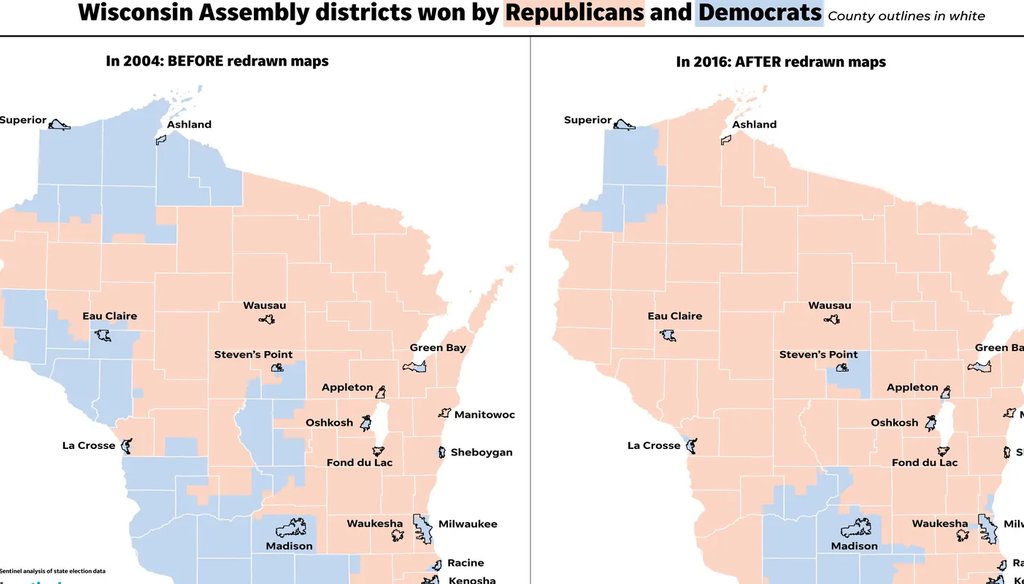



55 counties in Wisconsin have either held referendum votes or have had resolutions approved by a County Board in support of fair maps
Those 55 counties represent nearly 83% of Wisconsin residents
When Republicans won the Legislature and governor’s office in 2010, the party was in the driver’s seat for a vital function: Redrawing district maps to account for population changes.
Those maps led to a range of lawsuits -- which generally failed -- accusing the GOP of unfairly gerrymandering districts to give the party an unfair advantage at the polls.
Ten years later, as we approach another round of redistricting, the political landscape has changed, in that Democrat Tony Evers now holds the governor’s office.
Has it changed more than that?
State Sen. Chris Larson (D-Milwaukee) claimed in a Nov. 9, 2020 tweet that jurisdictions representing about 80% of Wisconsin residents have passed resolutions or referendums in support of fair maps.
"All told, jurisdictions representing about 80% of WI residents have passed referendums or resolutions in favor of fair maps," he wrote in the tweet. "Gerrymandering is an affront to our Democracy, and I will continue to fight for WI leg. maps that reflect the will of the people, not the party in power."
Is he right?
In 2011, maps were drawn behind closed doors. Republican lawmakers and their aides were required to sign nondisclosure agreements in order to look at maps of their own proposed districts before the public could see them.
The maps prompted a swirl of lawsuits, with Democrats alleging that Assembly districts had been unconstitutionally gerrymandered to give Republicans an advantage.
In the end, Democrats ended up dropping the gerrymandering case, according to a June 2019 Milwaukee Journal Sentinel article, after the U.S. Supreme Court ruled that federal courts can’t consider allegations that partisans drew election maps to favor themselves.
During the decade, Democrats won back only three Assembly seats, including two during the 2020 elections, according to a Nov. 3, 2020 Journal Sentinel article, and one in 2018, according to an Oct. 29, 2020 PolitiFact report.
Evers, elected in 2018, has called for a nonpartisan commission to look at Census data and draw fair maps. He included the proposal in his first budget, but it was denied. Instead, he created the panel by executive order in 2019, according to a July 2020 article from the Journal Sentinel. His panel bars party officials, lawmakers and former lobbyists from joining it.
In practice, it’s unclear what that will mean in 2021.
Republicans in the Legislature have not signed onto the commission idea, so they may pursue maps of their own -- though this time they would need support from Evers, instead of former Gov. Scott Walker, a Republican.
If the two sides deadlock, the matter would end up in front of a judge.
In addition to the action by Evers, various local government bodies have been going on the record in support of "fair maps." They range from Lincoln County to Milwaukee County.
The wording varies, but generally speaking they ask for the creation of nonpartisan procedure for the preparation of legislative and congressional redistricting plans to increase accountability and transparency.
These referendums are at the center of Larson’s claim.
When asked for evidence to back Larson’s claim, aide Justin Bielinski noted the senator wasn’t the only one to cite the 80% number -- that Gov. Tony Evers had even done so in the announcement of the People’s Maps Commission. Bielinski also cited information from the Wisconsin Democracy Campaign.
According to the Wisconsin Democracy Campaign, a nonprofit, non-partisan government watchdog group that has tracked gerrymandering, 55 counties have passed either resolutions, referendums or both. Referendums are voted on directly by residents, while resolutions are voted on by county boards.
The population of those counties adds up to 4.8 million people, according to the group. The state has about 5.8 million residents, based on the latest census data.
Thus, those numbers mean nearly 83% of Wisconsinites are represented by jurisdictions who have signaled support for fair maps.
Larson said "jurisdictions representing 80% of Wisconsin residents" passed referendums or resolutions "in favor of fair maps."
According to the Wisconsin Democracy Campaign, jurisdictions representing about 82% of Wisconsin’s population have approved either a referendum, resolution or both in support of fair maps.
We rate this claim True.
Twitter, Tweet from Sen. Chris Larson, Nov. 9, 2020
Milwaukee Journal Sentinel, "Wisconsin Democrats drop gerrymandering case as Republicans say they may seek fees for taxpayers," June 28, 2019
Milwaukee Journal Sentinel, "Preliminary results from Wisconsin legislative races show Democrats flip two Assembly seats, Republicans flip two Senate seats," Nov. 3, 2020
PolitiFact, "Yes, because of gerrymandering only one Republican Assembly seat has flipped Democratic since 2013," Oct. 29, 2020
Milwaukee Journal Sentinel, "Tony Evers’ redistricting commission launched with a panel of 3 retired judges to review applications," July 9, 2020
Email conversation with Matt Rothschild, Executive Director of the Wisconsin Democracy Campaign, Dec. 7, 2020
Email conversation with Justin Bielinski, Communications director for Sen. Chris Larson, Dec. 7, 2020
United States Census, QuickFacts Wisconsin, Dec. 8, 2020
In a world of wild talk and fake news, help us stand up for the facts.
